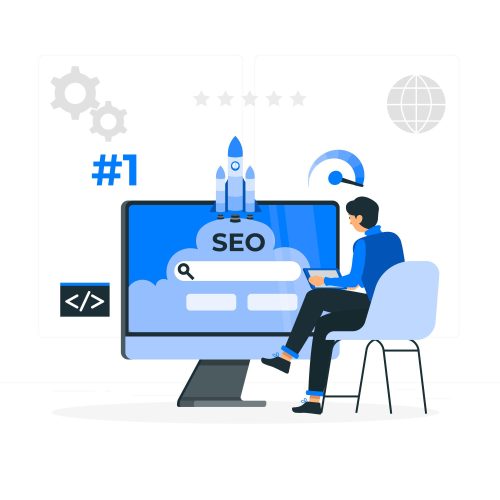
In a world where technology is advancing at an unprecedented pace, artificial intelligence (AI) has become a ubiquitous force, reshaping industries and revolutionizing the way we work. One area that stands at the intersection of this technological evolution and business strategy is Search Engine Optimization (SEO). As digital landscapes expand and businesses vie for online visibility, the question looms large: Will AI replace SEO jobs? In this blog, we’ll delve into the intricacies of AI and SEO, exploring their current relationship, potential advantages, limitations, and the fascinating future landscape they might create.
Understanding AI and SEO
Before we dive into the potential impact of AI on SEO jobs, it’s crucial to understand the two key players in this scenario: AI and SEO. AI, as a broad concept, refers to the development of computer systems that can perform tasks that typically require human intelligence. These tasks range from data analysis and problem-solving to language understanding and even creative content generation. On the other hand, SEO, or Search Engine Optimization, is the practice of optimizing digital content to rank higher on search engine results pages (SERPs), thus increasing online visibility and organic traffic.Intersection of AI and SEO: How AI is Already Influencing SEO Strategies
The marriage of AI and SEO is not a futuristic concept; it’s already a reality shaping the digital landscape. AI-powered tools are making waves in the SEO industry, automating certain tasks and providing valuable insights that guide decision-making. Let’s explore some of the ways AI is currently involved in SEO:Automated Content Creation:
AI-generated articles and blog posts are becoming increasingly common. Platforms like OpenAI’s GPT-3 can produce coherent, contextually relevant content based on given prompts, potentially reducing the time and effort required for content creation.
Analysis:
AI-driven insights are revolutionizing keyword research and trend analysis. Advanced algorithms can sift through vast amounts of data to identify high-potential keywords and emerging trends that can inform SEO strategies.
On-Page Optimization:
AI tools are employed to enhance website structure and content quality. These tools analyze content readability, keyword usage, and overall page structure, providing actionable recommendations for optimization.
Voice Search Optimization:
With the rise of voice-activated devices, AI is helping adapt SEO strategies to cater to voice-based search queries. Optimizing for conversational keywords and natural language patterns is crucial in this realm.
Algorithm Updates:
Search engines frequently update their algorithms, impacting website rankings. AI helps SEO professionals stay abreast of these changes and adapt their strategies accordingly.
Potential Advantages of AI in SEO
AI’s integration into the realm of SEO comes with a host of potential benefits that can significantly impact efficiency and decision-making:Enhanced Efficiency:
AI’s ability to process and analyze data at unprecedented speeds can dramatically expedite the SEO process, from keyword research to content optimization.
Data-Driven Insights:
AI-generated insights enable more informed decision-making, empowering SEO professionals to create strategies based on real-time data and trends.
Scalability:
AI’s capacity to handle large-scale tasks makes it an invaluable asset for businesses seeking to optimize a multitude of web pages and content pieces.
Personalization:
AI can analyze user behavior and preferences to deliver personalized content, enhancing user experience and engagement.
Human Element in SEO
While AI’s potential is undeniable, it’s important to recognize the unique value that human expertise brings to the field of SEO:Creativity and Empathy:
Human content creators infuse their work with creativity and empathy, crafting narratives that resonate with audiences on a deeper level.
Strategic Thinking:
Developing SEO strategies that are tailored to specific business goals and contexts requires the nuanced thinking that only humans can provide.
Adaptability:
SEO professionals navigate the complex and ever-changing landscape of search engine algorithms, adjusting strategies to stay ahead of the curve.
Client Interactions:
Building relationships, understanding client needs, and fostering collaboration are essential aspects of SEO that rely on human communication skills.
Limitations of AI in SEO
While AI holds promise, it also faces certain limitations that underscore the continued need for human involvement:-
Lack of Emotional Intelligence:
AI struggles to grasp the complexities of human emotions, making it challenging to create content that deeply resonates with audiences.
-
Contextual Understanding:
AI can misinterpret nuanced contexts, potentially leading to content that is irrelevant or inappropriate.
-
Unpredictable Algorithm Shifts:
Rapid changes in search engine algorithms can catch AI off guard, necessitating human intervention to adapt strategies swiftly.
-
Ethical Concerns:
Ensuring AI-generated content adheres to ethical and legal standards remains an ongoing challenge.
The Future Landscape
As we peer into the future, it’s clear that AI and humans will coexist in the realm of SEO, each contributing their unique strengths to create powerful synergies:Coexistence of AI and Humans:
Collaboration between AI-driven insights and human creative thinking will yield optimal SEO strategies.
-
Upskilling and Redefining Roles:
SEO professionals will shift from routine tasks to more strategic roles, leveraging AI to focus on high-level decision-making.
-
Continuous Learning:
Adapting to evolving AI technologies will become a crucial skill for SEO experts, ensuring they remain at the forefront of industry trends.
-
New Opportunities:
Emerging roles will arise, such as AI-assisted SEO specialists and algorithm managers, creating fresh avenues for professionals to explore.